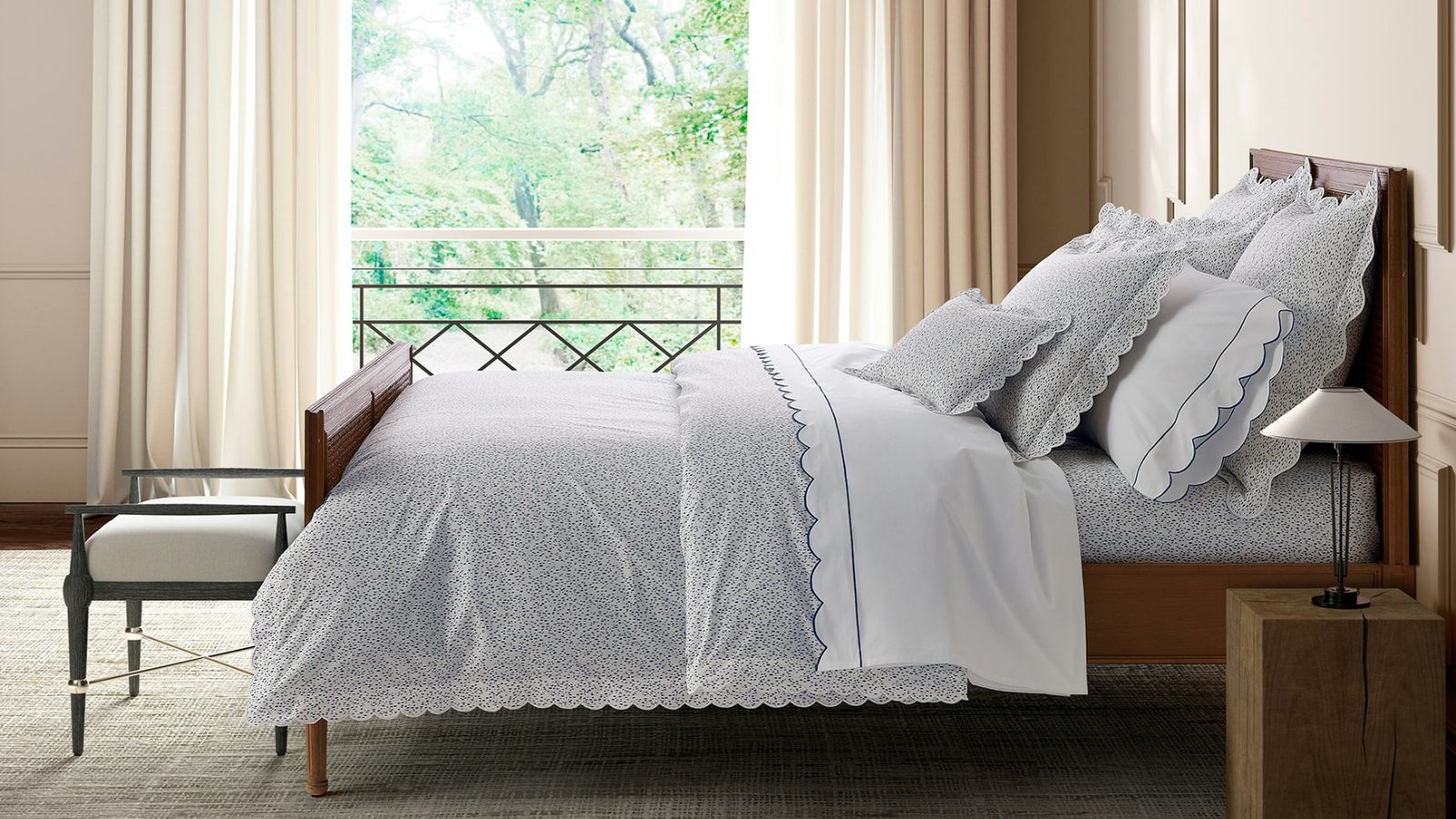The Complete Guide to Bedding in 6 Easy Steps: Find the Best Buys, From the Best Brands
The best bedding doesn't just look stylish – it can also promote quality sleep by ensuring you remain cool and comfortable. This guide will tell you which bedding types to buy to suit your needs, and the best places to buy bedding

It's simple: find the right bedding for you, and you'll sleep more comfortably. That means choosing bedding that allows you to sleep at a temperature that suits you, that offers a tailored comfort level, and which might even be hypo-allergenic. Plus, of course, it needs to suit your budget.
In this guide, we’re sharing jargon-busting expertise on the best bedding materials, the layers that can be used to dress a bed, sizing, the best bedding brands, and where to shop them.
Whether you’re upgrading on your existing bedding, selecting it for a first home, or giving bedding as a gift, our complete guide contains the details that will allow you to buy bedding with confidence.
1. Types of Bedding: What Do You Need?
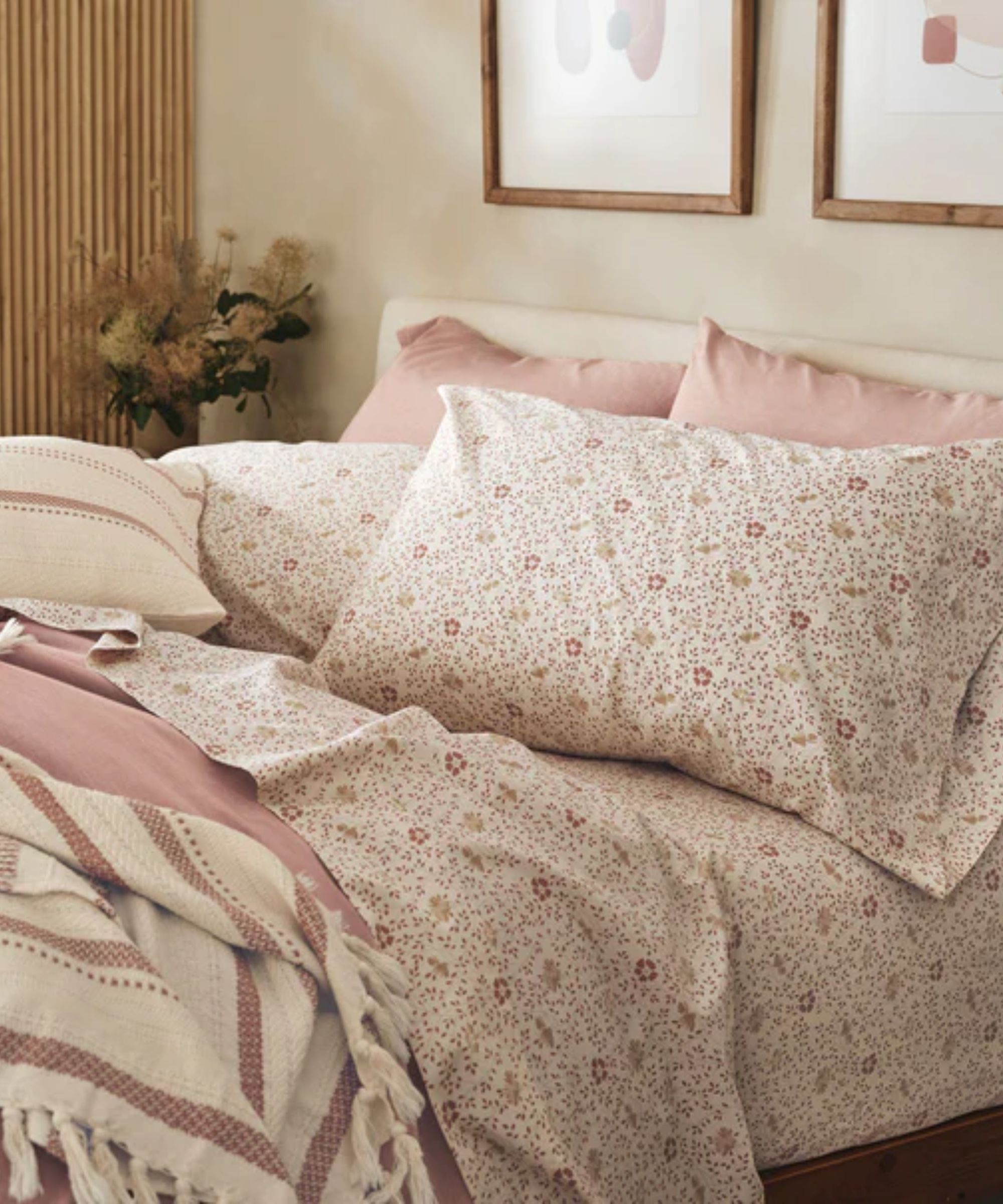
A well-dressed bed combines many bedding essentials beyond the mattress, such as the best bed sheets, and might also make use of extras such as mattress toppers, throw pillows, and bed skirts. Below, we explain bedding types so you know exactly what you need for your bed.
- Bed skirt – to cover a box spring, and perhaps to hide underbed storage.
- Blanket or quilt/coverlet/weighted blanket – choices that can top bed layers as desired and might be changed seasonally.
- Duvet or comforter – whichever your preference, this will provide warmth. They are different; the former is warmer and heavier.
- Duvet cover or comforter cover – the former is a separate layer of bedlinen while a comforter cover is an outer covering.
- Fitted sheet – the first layer of a well-made bed and also known as a bottom sheet, this covers the top and sides of a mattress. Elasticated corners make for a secure fit but sizing it to the mattress, including its depth, is crucial to keeping fitted sheets on a bed.
- Flat sheet – the next layer above a fitted sheet and also called a top sheet, it lies below a duvet or comforter. It’s not a must-have but it can be easier to wash it weekly rather than having to wash a bulkier duvet cover every week. There is a huge range of choice when it comes to sheets, with cooling sheets a favorite with hot sleepers (these needn't be expensive by the way; we recommend plenty of Amazon cooling sheets for shoppers on a budget). For those looking for hotel-quality bedding, we also recommend luxury bedlinen where budget is less of a consideration.
- Hypoallergenic bed sheets are made from materials that are less likely to collect or create allergens, such as lint, mold, and dust mites. Some of the most popular hypoallergenic materials for bed sheets include cotton, bamboo, linen, silk, and microfiber.
- Mattress protectors are designed to keep your mattress clean of spills, dust and moisture (plus perhaps pet hair!). They come in a range of materials, some offering water-proofing, others offering protection from bed bugs and dust mites.
- Mattress toppers are a comfort layer that can be added to a mattress that you find too hard, or perhaps one that is due to be replaced. Or, maybe you need to buy a mattress topper for a dorm bed to see a student through college?
- Pillows – the best pillows need to complement your sleep position as well as dress the bed. There are many types, from classic sleeping pillows to decorative Euro or Continental to bolsters.
- Pillowcases and shams – the former keep pillows clean as well as serving an aesthetic purpose as a bed layer while shams are purely decorative versions.
2. Bedding Materials: Which Is Best for You?
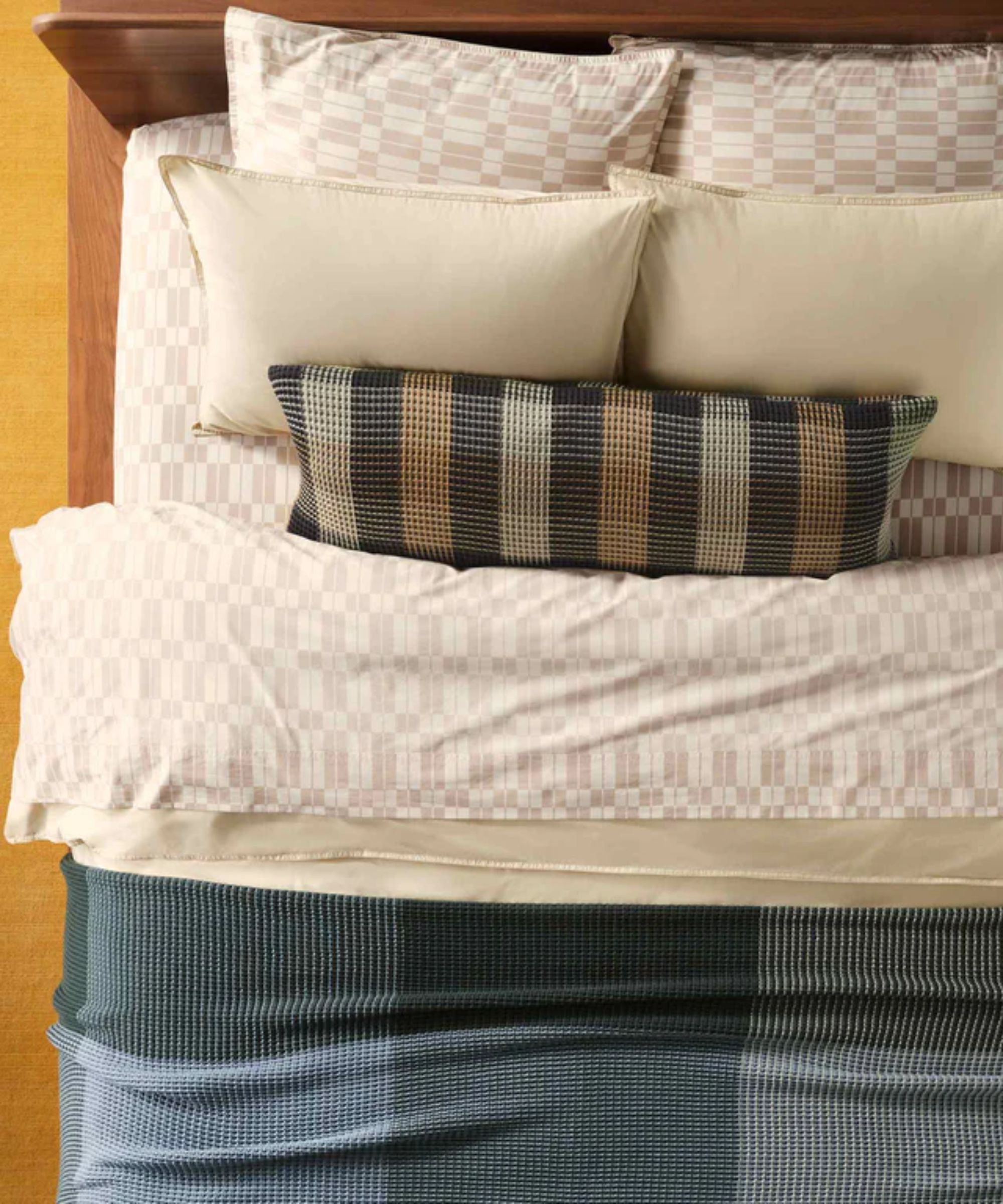
Bedding materials determine how your bed feels to sleep in, how well your purchases wash, and how warm or cool you might feel at night – with staying at a comfortable temperature crucial for good sleep this is worth researching with your individual needs in mind.
One way to choose materials is to check out the options depending on whether you or a family member is a hot sleeper, the climate's cold, or someone has an allergy.
Hot sleepers should look at: cotton percale, linen, bamboo, and Tencel. Whether you are a hot sleeper or not, bedding for summer could include cooling sheets in cotton percale, linen, bamboo, or silk, which can make it easier to sleep well.
Design expertise in your inbox – from inspiring decorating ideas and beautiful celebrity homes to practical gardening advice and shopping round-ups.
Winter bedding might involve a swap to cozy flannel sheets or cotton sateen and/or making changes to the layers of a bed from lightweight coverlets to insulating quilts and weighted blankets.
A summer weight duvet could be exchanged for one with a higher tog rating, but bear in mind your own body temperature, says Richard Boyle, CEO at Fremaux Delorme and expert at Brinkhaus. 'If you are generally a warmer person, a higher tog might be too warm for you as the materials will store your heat and could cause overheating,' he says.
Timing is important. ‘If you are looking to switch to something a bit heavier and warmer for the fall and winter, you may want to consider changing out your summer bedding to a down duvet or comforter halfway through the fall season,’ says Parima Ijaz, bedding expert and founder of Pure Parima bedding.
Guest room bedding should promote comfort. Cotton sheets are preferable as they will suit a majority of sleepers and and look wrinkle free (unlike linen), but are easy to launder. Having both a winter and summer weight duvet available to use on a guest bed is ideal, and blankets or coverlets can be layered on top for use as needed.
Dorm room bedding should be durable and easy care with cotton blends a good choice for sheets, along with a comforter plus a blanket to layer on the bed. A mattress topper for a dorm bed can transform a poor quality mattress, while taking a pillow that suits sleeping position will also aid good sleep.
Allergy sufferers: consider silk, organic cotton, or bamboo lyocell.
Here, we dig a little deeper into the best materials for bedding.
Cotton
- Cotton is an enduringly popular choice and one of the best materials for bedding, and you can select from different weaves and types.
- Cotton percale is what you might sleep in at a high-end hotel. Woven one-thread-over, one-thread-under, it’s breathable bedding and has excellent durability.
- Cotton sateen is softer, with a smooth silky texture. As it's woven three-threads-over, one-thread-under, it provides more warmth than percale weaves.
- Egyptian cotton denotes a coveted species of the plant. It’s prized for long, strong, fine fibers that create bedding with a luxurious soft feel.
- Supima is a brand name for US-grown pima cotton. The long fibers make for strong and soft sheets.
Linen
If you're weighing up cotton vs linen sheets, both score points for being natural materials. In the case of linen it's the fibers of the flax plant.
'The highest quality is made from French or Belgian flax, which grows taller than flax grown in other places,' says Byron Golub, vice president of product & merchandising at Saatva . 'The taller the flax plant, the longer the fibers taken from these plants to produce yarn. Longer fibers mean better breathability and moisture-wicking properties.'
Linen feels more textural than cotton, and softens over time but that’s the feel – it’s durable. For some, linen’s tendency to wrinkle is a downside but, for others this naturalness is a desirable aesthetic.
Bamboo
Shopping organic bedding? Another natural alternative is bamboo, the natural fabric that comes from the pulp of bamboo grass, is hypoallergenic, and breathable.
Bamboo lyocell is the option for eco-conscious shoppers since bamboo viscose or poly blends tend to incorporate plastics or harsh chemicals.
Silk
Silk bedding sounds luxurious and it is. Made from the cocoons of silkworms, it is wonderfully soft and smooth. Choose silk both for insulation in cold weather, but good temperature regulation when it’s warmer. Hypoallergenic properties can make it a top pick for some.
Disadvantages include a higher price point than other materials, and its relative delicacy, which means it needs to be laundered with care. And while you may not want silk sheets for this reason, consider silk pillowcases.
‘They can feel cooler than other pillow materials, which might help if you sleep hot,’ says Jeff Kahn, co-founder and CEO of Rise Science. Pillowcases in silk can also help keep hair moisturized and stay tangle free, be kinder than other materials on dry and sensitive skin, and even keep signs of age at bay.
'They may help prevent wrinkles because the smooth quality of the fabric produces less friction, which means it won’t tug at your skin as much as a fabric like cotton,' says Jeff.
Flannel
Flannel is soft woven fabric, but its fibers can be cotton (most often), wool, or synthetic, so you can exercise a material preference if you check labels when buying.
Favored for warmth, flannel also feel cozy because of its raised nap, a result of brushing. This gives it its insulating properties. Pick heavier weight flannels to get the benefit of their warmth in winter.
Blends and synthetics
Blended fabrics such as polycotton, Tencel, and microfiber can offer some useful qualities, although there are some drawbacks.
Polycotton, combining synthetic with natural fibers, is less expensive than pure cotton. It’s not as soft, though is still comfortable, and it is durable. It’s also more wrinkle resistant.
Tencel is semi-synthetic fabric made with eucalyptus wood pulp. Thermoregulating and moisture-wicking,with a smooth and silky finish, Tencel is good for hot sleepers.
Microfiber is often made entirely from synthetic fibers, although it can be made with wood pulp. Affordability and wrinkle resistance can recommend it and it's durable and feels soft. On the downside, it can feel hot to sleep in and can generate static.
3. Best Bedding Brands USA
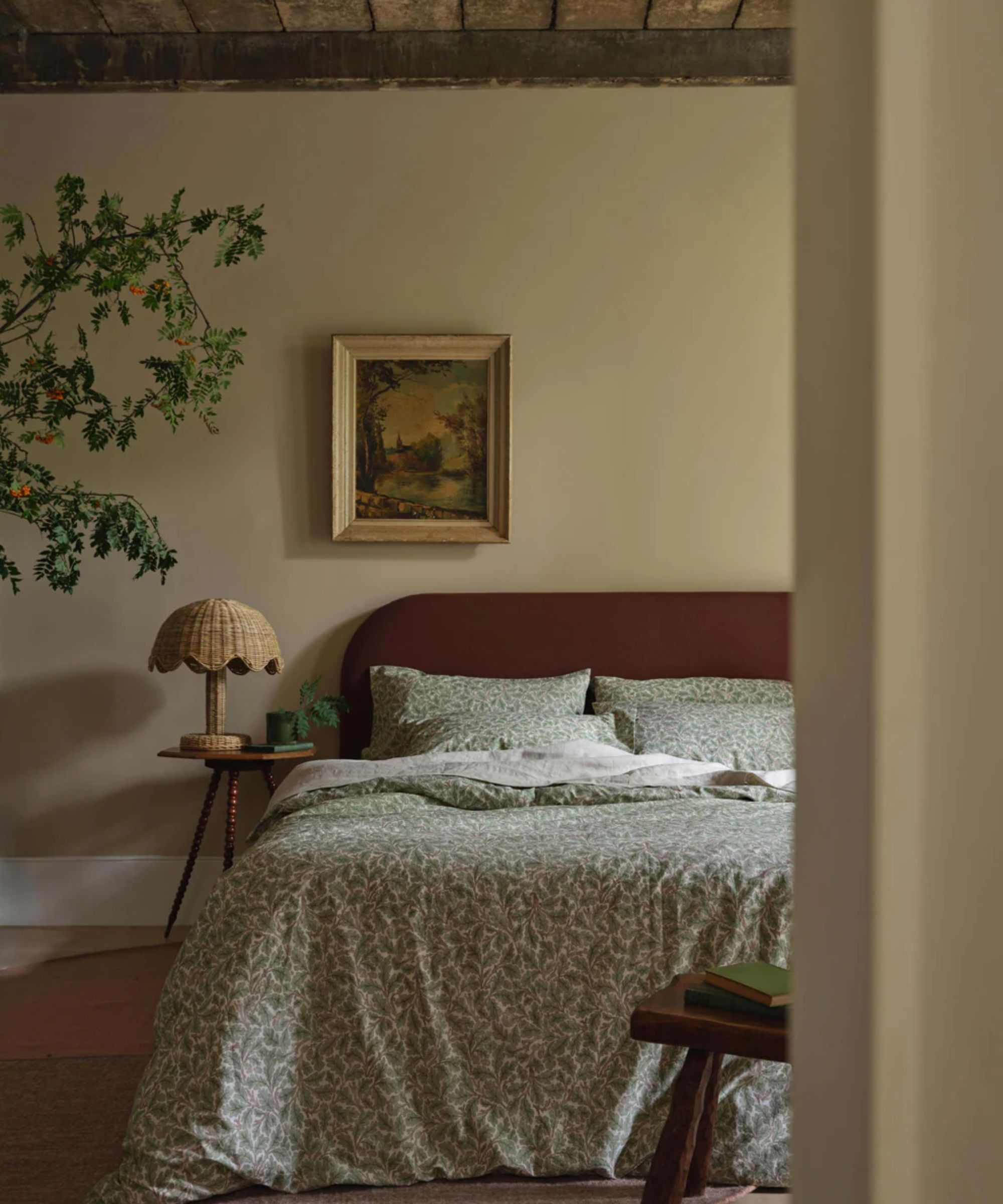
Knowing where to buy bedding can save trawling through the abundance of options that can make shopping feel like hard work. Below, we've recommended our favorite, tried and trusted bedding brands – both affordable and luxury – whether you prefer to to buy bedding online, or would rather shop in store.
Amazon
Best for big name brands and smaller stores $-$$
Amazon offers an enormous choice of bedding – but that can be overwhelming, so our advice is to make the most of the search filters.
You can shop for bedding by size, material, thread count, price, and special features (say, fade-resistant or anti-pilling). Check customer reviews to make sure you're getting the most for your money.
As well as the value Amazon Basics, look out for the best bedding brands on Amazon; our top three are Boll & Branch, Cozy Earth, and California Design Den.
Anthropologie
Best for on-trend designs $$
Anthropologie doesn’t have the widest range of bedding in our A-Z, but whether you want to bring the latest looks to your bedroom or introduce fabulous textures, it’s the place to browse. Quilts are bestsellers and well worth checking out.
Avocado
Best for organic fibers $$-$$$
Avocado is known for its certified organic mattresses – including the Avocado Green Mattress, which we tested (the link, left, will take you to the review, where we gave it a four-and-a-half star rating).
But it also sells luxury bedding that is GOTS (Global Organic Textile Standard) certified. One recent reviewer of its organic cotton sheets says, ‘They are so comfortable and easy to care for’ while another says its natural linen sheets are ‘phenomenally comfortable’.
Bed Threads
Best for color choice
Bed Threads’ French flax bedding comes in every conceivable color. Experiment with your own color combinations or opt for one of Bed Threads' best-selling mixes.
We like Oatmeal & White Stripe to add depth and dimension to a classic white bedspread or go cooler with tones of Fog, Lagoon, and Charcoal. Organic cotton bedding is a new addition with eight hues to pick from.
Boll & Branch
Best for light and fluffy down duvets $$$
Boll & Branch bedding is carefully finished and beautifully presented: it's the destination of choice for style-savvy shoppers with money to spend. You can shop for bedding by color, including warm neutrals, cool blues, fresh greens, deep purples and soft pinks.
Particular favorites for us are the Signature Hemmed Sheet Set, woven to create a glossy sheen, and the Down Duvet Insert in three weights to suit each season.
Brooklinen
Best for range of bedding $$
Brooklinen offers bath linen, too, but has a range of bedding products, sizes, materials, and colorways that isn’t beaten by the specialist bed stores. The site is super-easy to navigate with filters for fabrics, including crisp percale, silky sateen, and washed linen.
Check out the Brooklinen Luxe Core Sheet Set, top of our best bed sheets guide, its Down Comforter, one of our best cooling comforters for hot sleepers, and Marlow Pillow, adjustable to suit all sleeping positions.
Cozy Earth
Best for bamboo and silk bedding for hot sleepers $$-$$$
Cozy Earth specializes in bamboo bedding. Naturally moisture-wicking and antimicrobial, bamboo is built to bust the bacteria that breed in sweaty, sticky environments, such as bed sheets. If you want to level up to the next layer of luxury, you could shop their range of silk bedding.
Take a look at the Bamboo Sheet Set, of which one reviewer said, 'These are pure luxury. They are packaged beautifully, feel incredible and look gorgeous', or the Silk Pillow, which feels soft and sumptuous. Even through a cotton pillowcase, we could feel the cooling effects of the Mulberry silk.
Crate & Barrel
Best for a modern aesthetic $$-$$$
Crate & Barrel’s palette of shades has a sophisticated modern edge, and is complemented by appealing textural finishes plus designs with attractive pattern. Online it’s easy to filter by material and to find the fiber and weave that suits sleep temperature.
‘Reminiscent of staying in a luxury hotel,’ says a recent review of the bestselling Favorite Washed Organic Cotton Undyed Bed Sheet Set. Also a top seller is the Cozysoft Organic Jersey Quilt, of which a recent reviewer says, ‘The fabric is wonderfully soft and the texture is very attractive.’
DreamCloud
Best for all-season comfort $$-$$$
DreamCloud mattresses have won plaudits, but its bedding range includes all the essentials to dress a bed, plus protectors, pillows, and blankets.
The Serenity Sleep Bundle is a bestseller. 'Love love love the sheet set!' says a recent reviewer. 'I enjoy the labels for head and foot to make it easier to assemble on the bed. The sheets are cooling and comfortable.' And another says of the popular Weighted Blanket, 'It's amazing how it's cool on one side and warm the other side.'
ettitude
Best for bamboo lyocell bedding for eco-conscious shoppers $$
ettitude (or eco-attitude) is a must if you're keen to shop sustainably. Plenty of the best places to buy bedding work with bamboo, but they're mostly bamboo viscose or bamboo poly-blends. ettitude works with bamboo lyocell, which is free from harsh chemicals, toxins and plastics.
The Signature Sateen Sheet Set is number one in our best cooling sheets guide and among our best white bed sheets. Its Vegan Cashmere Blanket, plant-based and PETA-approved, is the closest we’ve tried to the real thing.
IKEA
Best for value $
IKEA may not offer bedding with an ultra-luxe look, but it's highly affordable and gets the job done. Our Sleep Editor Emilia Hitching visited the IKEA Hotell and sampled cool, crisp sheets, lightweight comforters, and foam pillows, ergonomically designed to support your neck and shoulders.
Our top picks from its range include the NORDSTÅLÖRT pillow, which is great for sleepers who suffer from back and neck pain, and the DVALA Sheet Set, made from durable, breathable cotton, which stands up to the wear and tear of nightly use and countless cycles in the washing machine.
Luxome
Best for super soft sheets $$
Luxome has a mission to make the softest sheets for luxurious sleep, and dozens of the reviewers on its site attest to its success. We recommend Luxome for anyone who likes the look and feel of sateen – the Luxury Sheet Set made from bamboo viscose is a great example and has great breathability, too.
We also like the LAYR Pillow, which has removable pillow inserts so it can be adjusted until it’s just right.
Macy’s
Best for a brilliant range of brands $-$$$
Macy’s is one of our best places to shop for bedroom furniture but count on its bedding selection, too, which offers a huge choice, an array of brands – including exclusives – and looks to suit traditional and modern tastes.
A recent reviewer calls its bestselling Charter Club Solid 550 Thread Count 100% Cotton Sheet Set, ‘Therapeutic and heavenly’. Also a top seller is the Hotel Collection 680 Thread Count 100% Supima Cotton Sheet Set, which attracts plenty of five star reviews and is acclaimed for softness.
Matouk
Best for beautiful bedspreads and custom details $$$
Matouk is a must if luxury bedding is on your agenda with the company’s linens handcrafted in its Fall River, Massachusetts factory. The beautiful bedspreads stand out while, out of all the bedding designs, the Antonia Collection is a Homes & Gardens' favorite because it offers the opportunity to play with prints and patterns before you commit to full-on florals.
Find a full selection of bedding alongside including sheets, bed skirts, duvet covers, and more. And for true individual style, take a look at the customization options available, including monogramming.
Nectar
Best for dressing the bed when you buy a mattress $$-$$$
Nectar is another brand known for its mattresses but which offers bedding you should know about as well. It has the same parent brand as DreamCloud, above, and offers a similar range including the Serenity Sleep Bundle (a bestseller), mattress protectors, pillows, and sheets.
One recent reviewer says of the Tri-Comfort Cooling Pillow, 'It’s soft, cool, supportive, and never loses its shape! It’s got zippers to help change the fluff level and it’s hands down the best pillow I’ve ever had'.
Parachute
Best for bedding innovations $$$
Parachute is known for its quality sheets but also its new innovations, including yarn-dyed fabrics. The technique means the back and front of the fabric look the same rather than a pattern or motif being printed on top of a color on one side only.
See the results on the company’s Percale Sheets, including the Bone color that our style editor recommends because even the faintest whisper of stripe can elevate your bed. Or try the wide stripe of the Percale in Dusk Stripe, which is nautical in the best way.
Piglet in Bed
Best for romantic linen in warm prints and patterns $$$
Piglet in Bed is the place to go if you're keen to play with prints and patterns. You'll find classic shades of white and oatmeal alongside dusk blues and warm clays, interspersed with subtle stripes and playful gingham prints with real retro appeal. If you're not sold on linen, but you love the look, then you can explore its cotton bundles or meet in the middle with a linen blend.
Our faves? The Heritage 100% Linen Bundle in a choice of 10 colors, the Botanical Green Gingham Linen Blend Duvet Cover, a classic print and a calming shade, and the Merino Wool Duvet, a thermoregulating insert.
Saatva
Best for sensitive sleepers $$-$$$
Saatva is another among the brands that might call mattresses to mind but also rewards your time when you’re shopping for sheets – including cotton sateen, cotton percale, flannel, and linen, plus duvet covers, blankets, pillows and more.
Materials are chosen to be hypoallergenic to avoid symptoms. 'I am sleeping through the whole night for the first [time] in several months and waking up without neck pain for the first time in over a year,' says a recent reviewer of the bestselling Latex Pillow.
Sleep Number
Best for easy bed making $$-$$$
Sleep Number’s Smart Bed brings tech to the aid of a better night’s sleep, but alongside are the essential bedding layers that also contribute to the search for comfort. Sheets include cotton blends that stretch to create a good fit, plus Supima cotton, and the SmartFit designs have elasticized edges, elastic corner seams and anchor bands to keep fitted sheets in place.
A recent reviewer says, 'Love this bedsheet. It stays in place with grip bands.' Shop here for mattress pads and toppers, blankets and coverlets and comforters and duvets, too.
Walmart
Best for bedding sets $
Walmart is a go-to if you want great value bedding buys of every type plus easy filtering to find what you need without wasting time. There’s a wide range of materials on offer, including practical blends and 100 per cent cottons. It’s the place to shop for dorm room bedding sets or if you need to dress a guest bed in a hurry.
Our favorites include the Comfort Canopy Hand-knit Throw Blanket with its textural chunky weave and its Oussum Satin Pillowcases, which are kind on skin and hair but also easy to wash.
Woolroom
Best for organic wool bedding for hot sleepers $$-$$$
Woolroom lives up to its name. Our Sleep Editor went on its Sleep Retreat and spent the night on a woollen mattress, under woollen sheets and a wool comforter, resting her head on a wool-filled pillow, discovering that wool keeps you comfortable without overheating.
We like the Woolroom Organic Washable Wool Comforter, which has three warmth levels to suit every sleep style and weather pattern, and the Deluxe Washable Wool Mattress Protector, one of the best cooling mattress protectors. Shop for sheets and comforter covers here, too.
4. Budgeting for Bedding: What to Expect
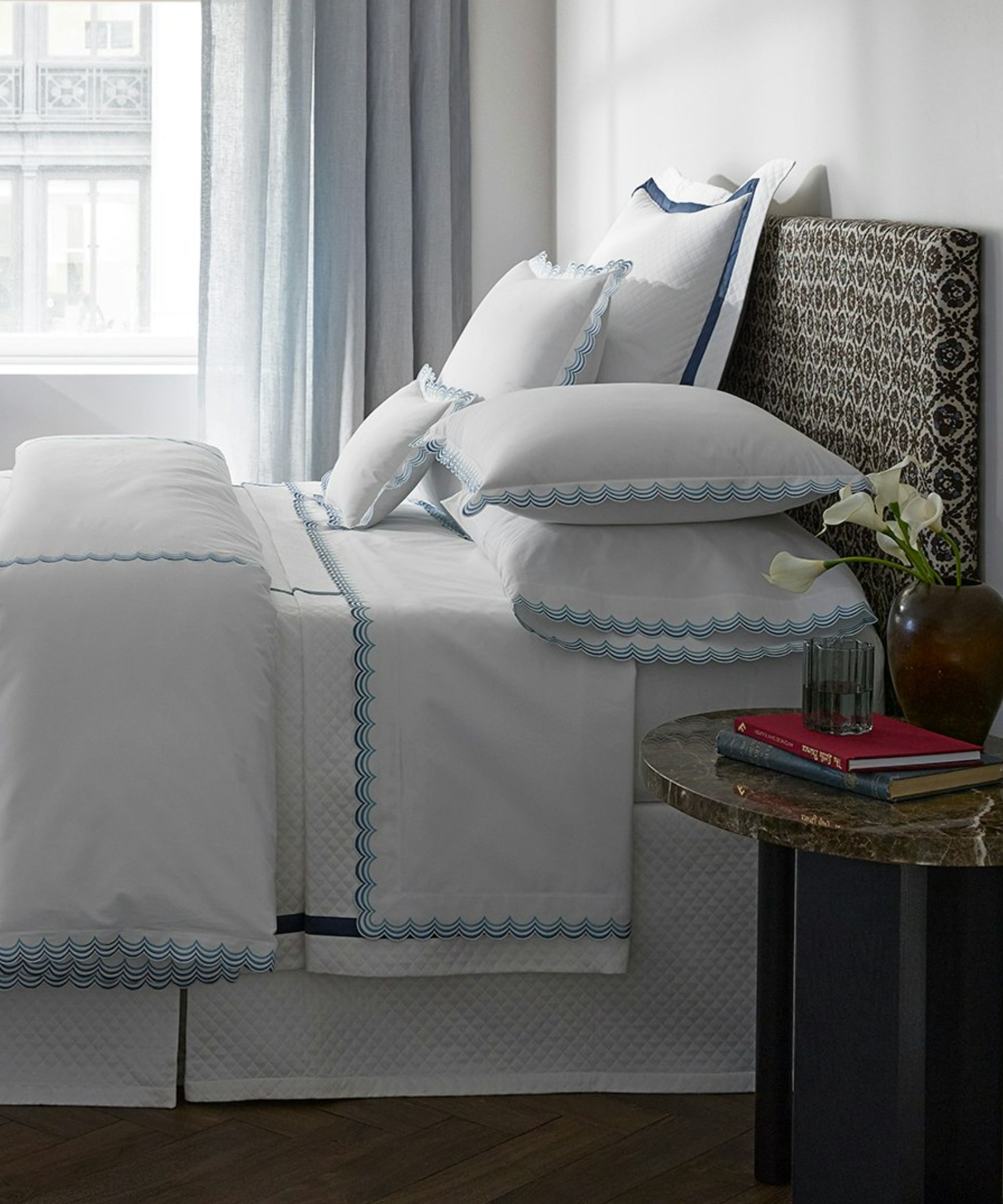
Pictured: Matouk Stella Duvet Cover
Fabric, its quality, and the complexity of the manufacturing process contribute to the price. To make the most of your spend consider longevity as well as cost since sheets at a lower price made of lower quality materials won’t offer the best durability so you’ll need to invest in a new set sooner. Typical prices you should expect to spend are listed out below:
Queen-sized sheet set: between $50 and $200, including a fitted sheet, a flat sheet, and two pillowcases.
Cotton sheet sets from affordable brands can cost from around $30; for a luxury set in this material expect to pay in a range from around $100 to $300. Look for long staple fibers – Egyptian, Supima, percale weaves – that retain their softness over the long term.
Cotton percale with a thread count of 200 to 400 can guarantee good quality and comfort and, without the price tag that comes with some materials, can be a sound investment.
Linen bedding comes with a bigger price tag with affordable options at around $170 while luxury sets cost from around $300 to $600. Linen can be worthwhile for hot sleepers and as a long term investment as it becomes softer over time.
Bamboo sheet sets are available from around $50 from affordable brands, while shopping from luxury brands could cost from around $275 to $600.
Silk sheets are a luxury option and you can expect to pay from around $300 to $1500 and more for a set. Silk could also prove a good buy but don’t forget the extra care it needs when laundering.
Blends and synthetics start from around $15 to $30 for a microfiber sheet set while some cotton blends can cost over $250 depending on their features.
Microfiber bedding will offer maximum savings but it won’t suit every sleeper, particular hot sleepers (it traps heat) and anyone who likes to sleep in natural materials.
Single ply bedding is more durable than multi-ply, so check the details.
A bedding bundle or set can typically be a cheaper way to dress a bed than buying its elements individually. However, be sure that you would choose everything that’s included; a set with a flat sheet won’t maximize your spend if you prefer to wash a duvet cover weekly and go without.
On a tight budget? Take a look at Target and Wayfair as well as the affordable brands in our list, above.
5. Bedding Sizing Guide: Get the Fit Right
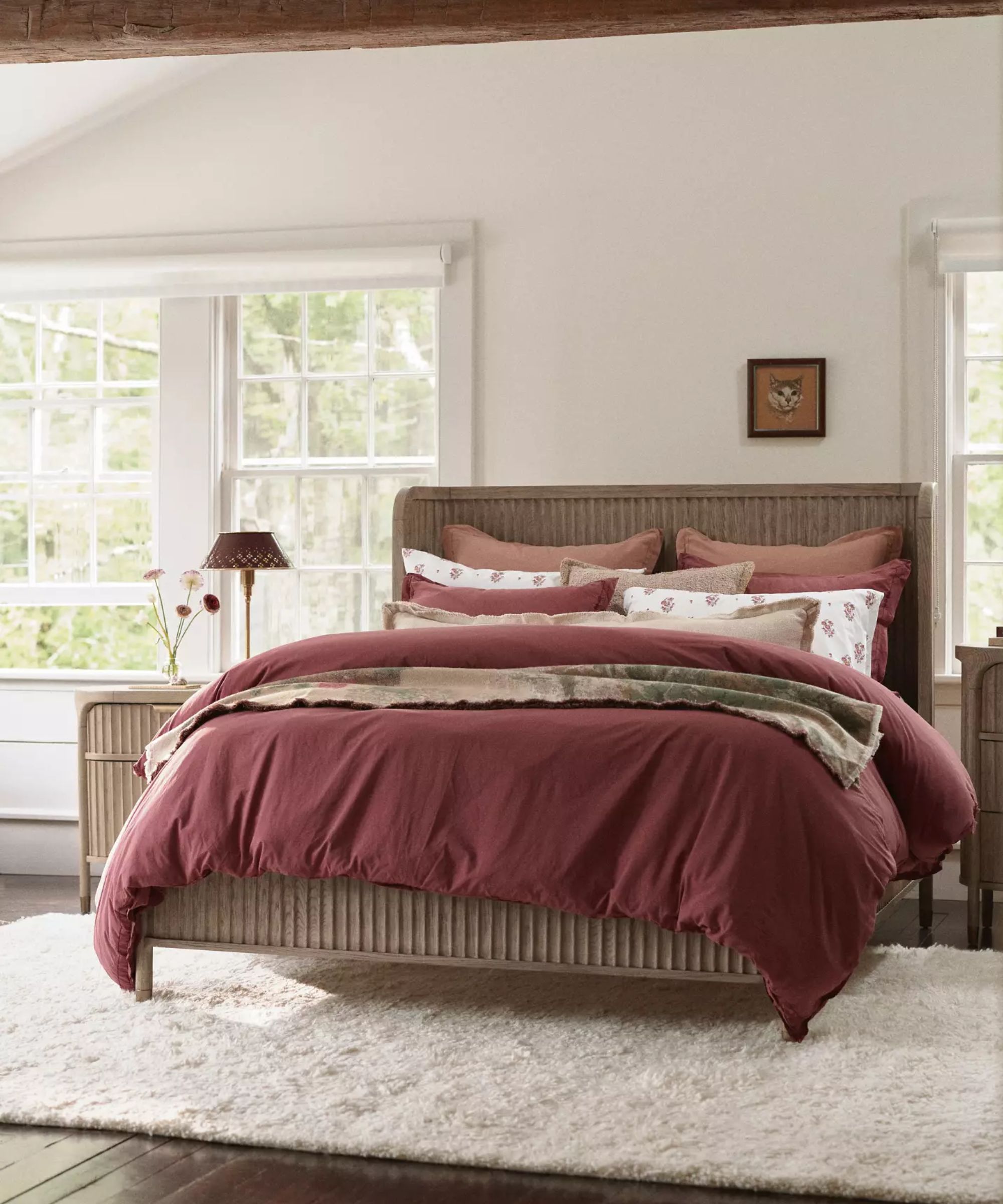
Bedding must be a good fit to look and feel its best and keep sleepers comfortable all night long. Our bedding size guide has the details on what fits each mattress, as well as how to measure the mattress.
Sheet sizes explained
Typical sheet sizes are:
Twin: 38 x 75 inches
Twin XL: 38 x 80 inches
Full: 53 x 75 inches
Queen: 60 x 80 inches
King: 76 x 80 inches
Californian King: 72 x 84 inches
Bear in mind, however, that while we're providing standard sizes, you should always check the actual dimensions of the sheets you’re interested in rather than rely on a label that says twin, queen and so on as sizes can vary between brands.
When you’re buying a fitted sheet knowing whether you need a deep pocket vs standard version is also essential. The pockets are the corners and these need to be sized to accommodate the height of your mattress. Without deep enough corners, the sheet won’t be held securely in place.
What’s considered a deep pocket varies between brands so, once again, it is vital to check the particular fitted sheet's measurements.
Measuring a mattress
Before you invest in new bedding it’s a good idea to measure a mattress. Remove the bedding to do so except for any mattress topper, which will count towards the mattress height. Use a metal tape measure as fabric versions can stretch making measurements inaccurate.
Measure from side to side bearing in mind that if your mattress curves outwards you’ll need to measure at its widest point. Measure the length, too, again at the widest point if the mattress curves at its edges. Measure the height of the mattress from top to bottom plus the mattress topper if there is one.
6. When Is the Best Time to Buy Bedding?
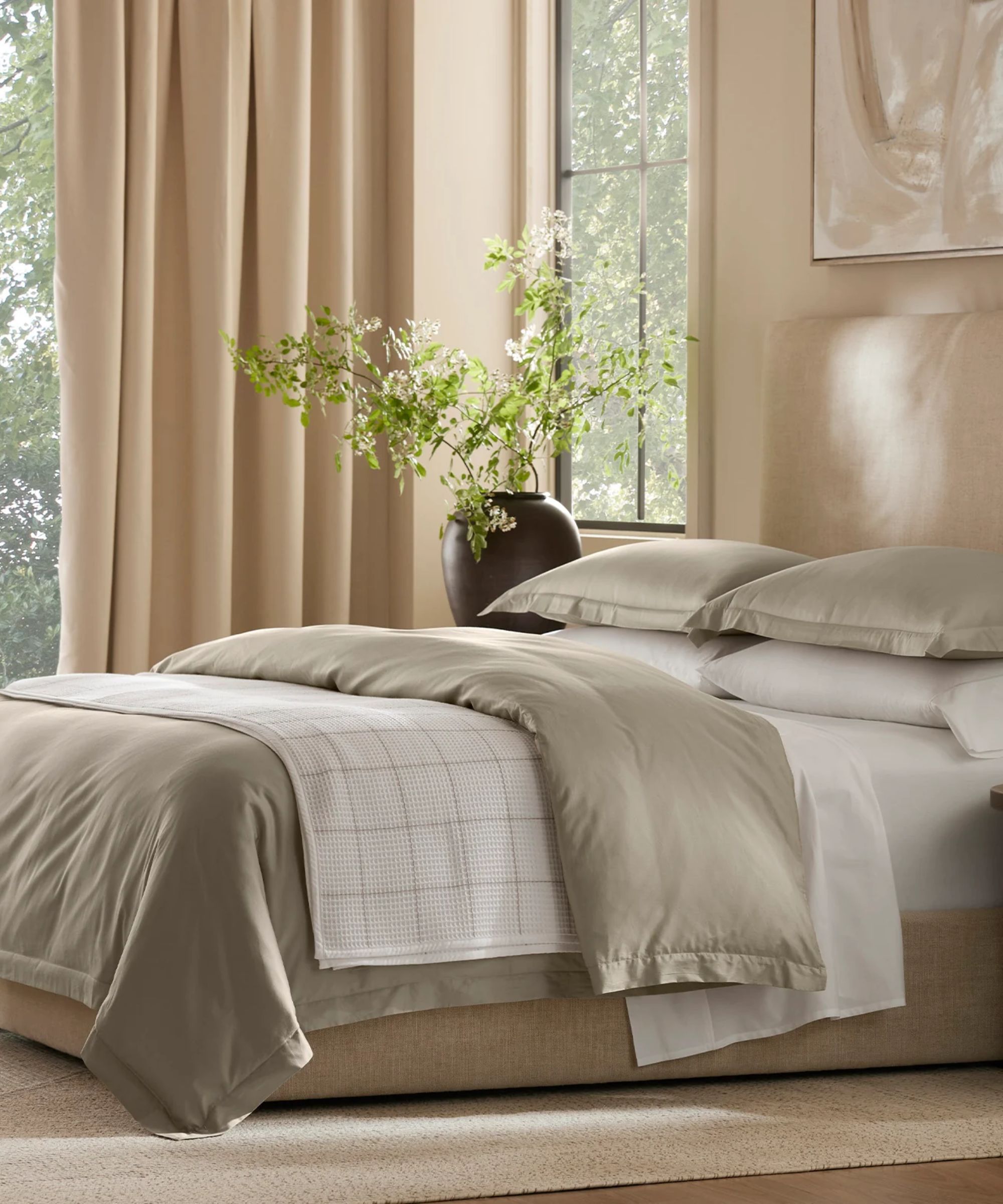
Pictured: Boll & Branch Percale Hemmed Duvet Set
One great thing about buying bedding from these best brands, is that many frequently hold bedding sales throughout the year, so if you're looking for a deal, you will definitely be able to purchase some of the best bedding with a good discount, what's not to love?
From summer sales, to fall and winter events and of course, Black Friday and January sales, there are plenty of opportunites secure a saving.
Our Bedding Experts

Parima created Pure Parima to bring back real luxury bedding based on its transparency and your valued trust. It holds itself to the highest standard by sourcing certified raw materials and producing timeless designs to bring back quality bedding that's truly luxurious.

Jeff is the co-founder and CEO of Rise Science, an energy and sleep tracking app. A Forbes 30 under 30, Jeff has also beean featured in Forbes, the New York Times, and the Harvard Business Review.

Richard is CEO of Fremaux Delorme, the parent company of French bedding manufacturer Yves Delorme. Richard has also worked closely with the likes of Ralph Lauren, BOSS Home and Brinkhaus.
Choose good bedding and it will keep you at the right temperature all night long and feel comfortable – both vital factors in getting the restful and restorative night’s sleep that contributes to health. The bedding you select is also a major contributor to the room’s style whether that’s anything from a laid back to a five-star hotel look.
To spend well whatever your budget, prioritize according to material, season, and bedding qualities to meet your sleep needs and your aesthetic.

Sarah is a freelance journalist and editor. Previously executive editor of Ideal Home, she’s specialized in interiors, property and gardens for over 20 years, and covers interior design, house design, gardens, and cleaning and organizing a home for Homes & Gardens. She’s written for websites, including Houzz, Channel 4’s flagship website, 4Homes, and Future’s T3; national newspapers, including The Guardian; and magazines including Future’s Country Homes & Interiors, Homebuilding & Renovating, Period Living, and Style at Home, as well as House Beautiful, Good Homes, Grand Designs, Homes & Antiques, LandLove and The English Home among others. It’s no big surprise that she likes to put what she writes about into practice, and is a serial house renovator.
